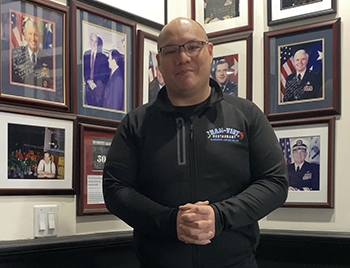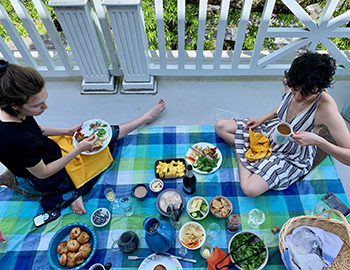The last shift
Laid-off restaurant workers struggle to make ends meet — some without unemployment benefits
Kate Andrews //April 23, 2020//
The last shift
Laid-off restaurant workers struggle to make ends meet — some without unemployment benefits
Kate Andrews //April 23, 2020//
For many restaurant workers, their final shifts fell on Saturday, March 14.
“We had kind of a weird weekend, and at Saturday night, it was so dead in there, we said, ‘Should we shut down?’” recalls Brandon Peck, bartender at The Jasper, a popular Richmond craft cocktail bar. “The governor had, that day, made a statement banning groups of more than 50. We said we just need to call it.”
Leslie Hong heard from her two jobs — as a front-of-house floater at L’Opossum and a server at Metzger Bar & Butchery, both in Richmond — on March 14 and 15. “We thought at the time it would be closed just through April,” she says of L’Opossum, a French-inspired restaurant that books tables months in advance and remained busy through its last service. “Then, a bunch of news happened over the weekend. By the end of that week, we were closed through all of April.”
And now, all three restaurants are shut down until at least June 10, the day Gov. Ralph Northam’s COVID-19 stay-at-home order is set to expire. Metzger’s sister restaurant, Brenner Pass, is still open for takeout, and Hong said the owners have spread tips to all staff members, even those who are out of work.
Hong and Peck are among an estimated 237,000 Virginia restaurant workers, or 78% of the state’s dining industry workforce, who have lost their jobs since March — laid off because there aren’t enough shifts available with dining rooms closed, or their workplaces are shut down completely. The National Restaurant Association forecasts that restaurants and the food service sector in Virginia stand to lose $1.3 billion in revenues for April.
Meanwhile, some restaurant owners have struggled to receive funding from the federal government’s Paycheck Protection Program (PPP), which allocated $349 billion nationwide in just 13 days before running out of money last week. More than 40,000 applications filed by Virginia businesses received $8.7 billion, according to the Virginia Bankers Association, but 22,726 small business applications totaling requests for $3.235 billion have not been filled.
Many servers, cooks, managers, bartenders and front-of-house staff are also navigating the unemployment system for the first time — and at a moment when the Virginia Employment Commission is overwhelmed with more applications than it has ever seen. As of the week ending April 18, 493,501 Virginians have filed initial unemployment claims since the pandemic began — more than the total number of initial unemployment claims filed during the last three economic recessions combined. Nationwide, one in six Americans have lost their jobs due to the coronavirus crisis, numbers approaching the Great Depression.

Christina Fiore, a server at The Roosevelt and Alamo BBQ in Richmond, also got laid off on March 14 and 15. She received a severance check from the Roosevelt’s owners and worked some takeout shifts there, but a blip in Fiore’s job history — a “voluntarily quit” job three years ago, she was told — disqualified her from receiving unemployment benefits temporarily. After getting that straightened out, the Virginia Employment Commission had the incorrect bank account number for her, she said. Finally, after speaking with three people at VEC, Fiore said she’s received one payment for a few hundred dollars.
“My back’s up against a wall,” she said. “I live alone. I have no family in Virginia. I really hope something comes together really soon.”
The good, the bad, the ugly
Lily Hargis, a pie tender at Richmond’s Proper Pie Co., has received a little more than $100 a week from VEC but has not yet received a federal check. “I applied pretty much the day I got laid off,” and it took about two weeks for her to see any money, Hargis said. “I had a job that wasn’t reflected in my job history when I applied for unemployment.”
Trying to speak to a person at VEC, Hargis kept getting disconnected after one ring. She tried 47 times in one day — she went into her phone history and counted — and then, finally, the call went through. “I heard, ‘There are 1,794 people in front of you. It was so insane.” After seven hours on hold, she finally reached someone.
“The woman I spoke with was incredibly kind,” Hargis said, and she’s been able to receive funds since then.
Peck got lucky. He got his $1,200 stimulus check from the IRS and started receiving the $600 weekly Federal Pandemic Unemployment Compensation supplemental check, in addition to state unemployment, within a couple of weeks after losing his bartending job on March 15. Others interviewed for this story said they had not received their IRS checks yet.

Cyan Sada, a student teacher who worked as a server and bartender at a Chili’s Grill & Bar in Chesterfield County, received state unemployment quickly but had to wait about a month to begin receiving the weekly $600 federal check, which landed this week by surprise in her bank account. Her parents helped her with April’s rent check. “If I was just getting my unemployment, I couldn’t make my rent,” she said. Virginia unemployment benefits are capped at $378 a week. She, too, received the IRS payment.
Hong applied for unemployment, “and that was a two-week process,” in which she was first notified that she didn’t qualify.
After calling the governor’s office and getting an email address for the head of customer relations at VEC, Hong says she was able to get her unemployment issue straightened out, and now she’s also receiving the weekly $600 federal unemployment supplement. Both she and Peck say the combination of state and federal funding has matched and even possibly exceeded their usual income, but it’s still a stressful time.
“I personally was very, very distraught for the first couple of weeks,” Peck said. “I like to keep myself busy all of the time.”
A musician and a longtime restaurant worker, Hong says, “Everything I’ve devoted my life to, it’s totally been pulled out from under my feet.”

Richard Tai Nguyen, operations director at his family’s Nam-Viet Restaurant in Arlington, has helped raise $7,500 for his 15 employees by selling restaurant gift cards.
“We try to take care of them the best we could, and paid staff up through the end of the month” when the Vietnamese restaurant closed on March 18, Nguyen said. Takeout and delivery, he noted, don’t bring in enough income to break even, so his family decided it would be better to temporarily close the business, which has been open since 1986.
“You can’t have your staff idle,” Nguyen said. “They’ve got families to take care of. A lot of them are anxious to come back to work. We’re hoping to get back as soon as we can.”
Also, he noted, the weekly $600 federal pandemic unemployment checks will be ending on the week of July 25.
Joyce Fogg, the VEC’s communications manager, acknowledges that the state unemployment benefits agency has been overwhelmed with calls and emails since the middle of March, with wait times “over two hours.” She’s not even part of the department that works directly with unemployment filers but she still receives 200 or 300 calls a day, she says, and the VEC’s customer service department is “inundated” with emails, to the point that it now has a 15,000-email backlog. To respond to the incredible volume of calls, the VEC has hired 25 more people for its call center in Grundy and 10 more in South Boston, as well as pulling in any member of the agency with unemployment insurance experience. The agency also has begun contracting with a third-party call center, Fogg said.
As for delays in payments, Fogg said, anyone who is self-employed, an independent contractor (also known as a 1099 worker) or gig worker does not qualify for unemployment benefits, but they must still go through the application process and be turned down for unemployment. Then they can reapply for Pandemic Unemployment Assistance (PUA), which covers nontraditional workers.
The $600 weekly federal unemployment payments kick in automatically for anyone who qualifies for unemployment benefits, Fogg added, but the federal payments didn’t arrive for most people until recently, and most can expect a couple of weeks of back payments. Also, “a lot of people are getting the federal stimulus check,” the $1,200 check from the IRS, she said. Although work remains very hectic and some VEC employees are working seven days a week, Fogg expects the situation will settle down. “My phone has stopped ringing in the middle of the night,” she noted.
Helping others

Randall McGarry, a manager at Secret Sandwich Society’s Richmond location, started a Facebook group for local restaurant workers that now has about 2,000 members who exchange stories about their unemployment experiences and post information about private funds that are lending support. Although McGarry has received state and federal funds himself, he realizes that many workers are falling through the cracks — undocumented workers, in particular.
“It’s a large and essential part of the restaurant community,” he said, noting that no one without a Social Security number can apply for unemployment benefits. So far, McGarry has raised $7,000 and is sending sums directly to individuals through Venmo and Cash App.
Many restaurant workers have applied for relief through private grants and loans, like Richmond’s Holli Fund, which provides rent assistance and other basics for restaurant workers in need.
At a particularly low point, Fiore was invited for dinner by friends who knew she was having difficulty. She feels a lot of “pride and camaraderie” in the Richmond restaurant scene, which has earned national accolades in recent years. It’s hard to tell what the landscape will look like in the future, but Fiore holds on to hope that things will work out in the end.
She advises fellow restaurant workers to “be resilient and be persistent and be annoying. I’ve been poor before; I’ve been broke before. I know how to survive.”
-


















